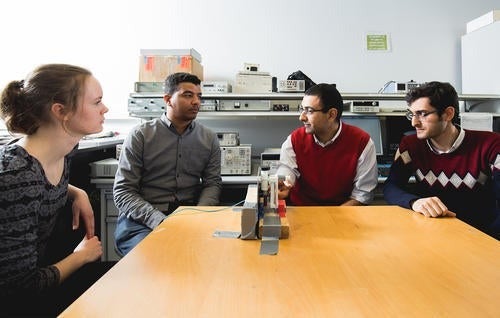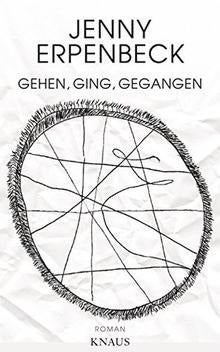Editor:
Brandon Sweet
University Communications
bulletin@uwaterloo.ca
Librarian receives Talman Award
This article was originally posted on the Library's website.
University of Waterloo Library's digital archivist, Danielle Robichaud, has received the James J. Talman Award, named in honour of the second Archivist of Ontario.
Given by the Archives Association of Ontario (AAO), the award is presented when an individual "has demonstrated an outstanding level of imagination and innovation in contributing to the profession, his/her institution, or the archival community, or who has pioneered any aspect of archival work."
Danielle was chosen largely for her work in implementing Calls to Action (PDF) from the Truth and Reconciliation Committee (TRC), through increasing Indigenous representation on Wikipedia by: improving existing articles (with more than 4,250 edits to her credit), training archivists on editing Wikipedia, and leading Wikipedia Edit-a-thons. Danielle has helped organize multiple edit-a-thons at Waterloo and local public libraries, giving staff, students and community members the skills and empowerment to improve the representation of Indigenous peoples and women on the popular crowd-sourced site.
In describing why she chose to focus on Wikipedia, Danielle told the AAO:
"By making the decision to move beyond guilt and defensiveness to an action-oriented view of reconciliation, I focused on creating a reliable page to raise awareness about the school system and facilitate the retrieval of resources by others seeking to improve their own understanding of its impact."
After Danielle contributed 434 edits to the Wikipedia page on the Canadian Indian Residential School System, it was designated a Featured Article by Wikipedia's editors, placing it among the best Wikipedia has to offer. Danielle also created a webpage for the AAO, giving archivists the tools they need to help implement the Calls to Action in working Towards Truth and Reconciliation.
In a letter addressed to our University Librarian, Beth Namachchivaya, chair of the awards committee Carolynn Bart-Riedstra described Danielle as "an inspiration to her colleagues for her unending enthusiasm and accomplishments that transfer beyond the University of Waterloo. She is always willing to share her knowledge and expertise with colleagues and is a credit to you and the University of Waterloo." Congratulations, Danielle!
Freeing diabetics from finger pricks using radar

This article was originally posted on Waterloo Stories.
Researchers at the University of Waterloo are developing new technology that would free people with diabetes from painful finger pricks to monitor their blood sugar.
A team led by engineering professor George Shaker has combined radar and artificial intelligence (AI) to detect changes in glucose levels without the need to draw blood several times a day.
“We want to sense blood inside the body without actually having to sample any fluid,” says Shaker, who is cross-appointed to mechanical and mechatronics engineering, and electrical and computer engineering. “Our hope is this can be realized as a smartwatch to continuously monitor glucose.”
The research involves collaboration with Google and German hardware company Infineon, which jointly developed a small radar device and sought input from select teams around the world on potential applications.
The system under development uses the radar device to send high-frequency radio waves into liquids containing various levels of glucose and receive radio waves that are reflected back to it.

George Shaker (second from right) discusses research into the development of a glucose monitoring system for diabetics with students (left to right) Karly Smith, Ala Eldin Omer and Mostafa Alizadeh.
Information on the reflected waves is then converted into digital data for analysis by machine-learning AI algorithms developed by the researchers.
The software is capable of detecting glucose changes based on more than 500 wave features or characteristics, including how long it takes for them to bounce back to the device.
Initial tests with volunteers at the Research Institute for Aging in Waterloo achieved results that were 85 per cent as accurate as traditional, invasive blood analysis.
“The correlation was actually amazing,” says Shaker. “We have shown it is possible to use radar to look into blood to detect changes.”
Next steps include refining the system to precisely quantify glucose levels and obtain results through the skin, which complicates the process.
The research team is also working with Infineon to shrink the radar device so that it is both low-cost and low-power.
The data analyzed by AI algorithms is now sent wirelessly to computers, but the ultimate aim is self-contained technology similar to the smartwatches that monitor heart rate.
“I’m hoping we’ll see a wearable device on the market within the next five years,” Shaker says. “There are challenges, but the research has been going at a really good rate.”
Collaborators at Waterloo include electrical and computer engineering professor Safieddin (Ali) Safavi-Naeni, kinesiology professor Richard Hughson and numerous students.
A study on the research, Non-invasive monitoring of glucose level changes utilizing a mm-wave radar system, was published in June in the International Journal of Mobile Human Computer Interaction.
SHAD 2018 design theme and other declarations
The design project for the SHAD high school enrichment program at Waterloo, and the other 15 host campuses across Canada, was launched last week.
This year's project theme is: How might we help Canadian communities be more resilient in a natural disaster?
As part of this challenge, teams conduct market research, design and build working prototypes, and write business models. The SHADs have just completed an intensive design thinking workshop, followed by a project launch presentation with Dr. Brent Doberstein, Geography and Environmental Management professor, and an expert panel with Dr. Shawna Peddle, director of the Partners 4 Action research network on flood resiliency, Professor Blair Feltmate head of the Intact Centre on Climate Adaptation, and Professor Eric Kennedy, assistant professor, Disaster & Emergency Management, York University.
The SHADs will hold a public open house to share their projects on Thursday, July 26, from 1:30 p.m. to 4:00 p.m. in the Great Hall at Conrad Grebel University College.

The Waterloo Centre for German Studies (WCGS) Reading Group has chosen a book for their summer meeting: Gehen, Ging, Gegangen / Go, Went, Gone, by Jenny Erpenbeck, translated from the German by Susan Bernofsky. A scathing indictment of Western policy toward the European refugee crisis, but also a touching portrait of a man who finds he has more in common with the Africans than he realizes. More details are available on the WCGS’ website.
The reading group will meet on Thursday, August 9 from 7:00 p.m. to 9:00 p.m. in a location to be determined. To RSVP, email Lori Straus by Friday 27 July.
This is a reminder that you are officially invited to attend Peggy Day’s retirement party, which will be held on Thursday, July 12 in Fed Hall's multipurpose room from 3:30 p.m. to 5:30 p.m., with speeches beginning at 4:15 p.m. "We hope you can join us, Peggy and her loved ones, as we celebrate her contribution to the University for over 41 years," says a note from Peggy's colleagues. RSVP to Liz Doede by sending an email to edoede@uwaterloo.ca.
Link of the day
When and where
Celebrate Canada's Diversity at the University Club, Tuesday, July 3 to Friday, August 10, 11:30 a.m. to 2:00 p.m., University Club.
CrySP Speaker Series on Privacy, “Where theory meets practice for privacy enhancing technologies” featuring Chelsea Komlo, HashiCorp, Monday, July 9, 2:30 p.m., DC 1304.
Coping Skills Seminar - Cultivating Resiliency, Monday, July 9, 4:00 p.m., HS 2302.
QPR Training, Tuesday, July 10, 1:30 p.m., Counselling Services, Needles Hall.
Master Your Job Search, Tuesday, July 10, 2:30 p.m., TC 1208.
CrySP Speaker Series on Privacy, “Where's Waldo?” — Privacy in the age of Internet-connected mobile technology, featuring Matthew Finkel, The Tor Project, Tuesday, July 10, 2:30 p.m., DC 1304.
New Faculty Nachos with the Faculty Association, Wednesday, July 10, 2:30 to 4:30 p.m., Grad House.
Coping Skills Seminar - Strengthening Motivation, Tuesday, July 10, 4:00 p.m., HS 2302.
Information Session for Graduating Students, Tuesday, July 10, 4:00 p.m., STC 0010.
Résumés, Careers and Personal Branding - Part 1, Tuesday, July 10, 4:30 p.m., TC 2218.
Science 101 Day, Wednesday, July 11.
Information Session for Graduating Students, Wednesday, July 11, 11:30 a.m., STC 0010.
Beyond Entrepreneurship panel discussion, Wednesday, July 11, 12:00 p.m., DC 1302.
Career Interest Assessment (Strong Interest Inventory), Wednesday, July 11, 1:30 p.m., TC 1112.
Childhood play spaces as What-If Worlds: The uncertainties of misogyny, racism, and classism, Wednesday, July 11, 2:30 p.m., QNC 1502.
Velocity Start: Setup Your Business Like A Boss, “A workshop that will address legal and accounting considerations that will affect your new business,” Wednesday, July 11, 7:30 p.m., Velocity Start, SCH 2nd Floor.
Exploring Your Personality Type (Myers-Briggs Type Indicator) - Part 1,Thursday,July 12, 12:30 p.m., TC 1112.
Getting published for grad students, Thursday, July 12, 1:00 p.m., South Campus Hall 228F.
NEW - Retirement celebration for Peggy Day, Thursday, July 12, 3:30 p.m. to 5:30 p.m., Federation Hall. RSVP to edoede@uwaterloo.ca.
Eco-Summit 2018: Building Commitment, featuring keynote speaker Tom Ewart, Senior Manager of Sustainability, The Co-operators, Thursday, July 12, 4:00 p.m. to 7:00 p.m., M3 1006 and foyer.
Résumés, Careers and Personal Branding - Part 2, Thursday, July 12, 4:30 p.m., TC 2218.
Open House - Harnessing Quantum Technologies, Friday, July 13, 9:30 a.m. to 3:15 p.m., Mike and Ophelia Lazaridis Quantum-Nano Centre.
WISE Lecture Series featuring Sankaran Ramalingam, WISE Senior Research Fellow, "Decoding the Energy Access Puzzle: An Overview of an Experiment at the Grassroots Level," Friday, July 13, 2:00 p.m. to 3:00 p.m., DC 1302.
CS seminar: The prehistory and history of RE (+SE) as seen by me, featuring Dan Berry, David R. Cheriton School of Computer Science, Friday, July 13, 3:00 p.m., DC 2585.
The Promise of Living: University Choir, Saturday, July 14, 7:30 p.m., Cedars Worship Centre, Waterloo.
Book Store Summer Reading Sale, Monday, July 16 and Tuesday, July 17, 9:30 a.m. to 4:30 p.m., SCH concourse.
Arts 101 Day, Monday, July 16.
Coping Skills Seminar - Cultivating Resiliency, Monday, July 16, 4:00 p.m., HS 2302.
Say it in your own words: Paraphrase & summary, Tuesday, July 17, 1:00 p.m., SCH 228F.
Coping Skills Seminar - Strengthening Motivation, Tuesday, July 17, 4:00 p.m., HS 2302.
Getting it done: Productive writing strategies for big projects, Wednesday, July 18, 10:00 a.m., SCH 228F.
Math 101 Day, Thursday, July 19.
5th Annual UWSA Golf Social Tournament, Thursday, July 19, 3:30 p.m., Foxwood Country Club. Deadline to register is Friday, July 6.
Velocity Billion Dollar Briefing, “Get introduced to five different billion-dollar problems,” Thursday, July 19, 7:30 p.m., Velocity Start, SCH 2nd Floor.
Beautiful Wanderings: orchestra@uwaterloo, Thursday, July 19, 7:30 p.m., First United Church, Waterloo.
Instrumental Chamber Ensemble Concert, Sunday, July 22, 7:30 p.m., Conrad Grebel Chapel.
WISE Public Lecture: Biogas - Resource Recovery & Clean Tech, Tuesday, July 24, 10:30 a.m. to 11:30 a.m., DC 1304.
Waterloo FileMaker Database Workshop presented by CoreSolutions, Tuesday, July 24, 1:00 p.m., DC1304.
Hallman Lecture: Whiteness, Women and Sex Tourism, Tuesday, July 24, 3:30 p.m., AHS 1686.
Lectures and classes end, Wednesday, July 25.
More Feet on the Ground - Mental Health Training, Wednesday, July 25, 9:00 a.m., NH 2447.
Velocity Fund Finals, “20 startups compete for $130,000,” Wednesday, July 25, 11:00 a.m., SLC Great Hall.
NEW - Waterloo Women's Wednesdays: Lunchtime Yoga, Wednesday, July 25, 12:00– p.m. to 1:00 pm., NH 3407.
Pre-examination study days, Thursday, July 26 and Friday, July 27.
Environment 101 Day, Thursday, July 26.
Examinations begin, Saturday, July 28.
Online examination days, Saturday, July 28 and Friday, August 3.
CrySP Speaker Series on Privacy featuring Vern Paxson, University of California, Berkeley, Tuesday, July 31, 11:00 a.m., DC 1304.
PhD oral defences
Statistics and Actuarial Science. Yingying Xu, "New Methods for Improving Accuracy in Three Distinct Predictive Modeling Problems." Supervisors, Joel Dubin, Joon Lee. Thesis available from MGO - mgo@uwaterloo.ca. Oral defence Friday, July 20, 1:30 p.m., M3 3001.
Biology. Xinda Lu, "Distribution and Function of Soil Thaumarchaeota." Supervisor, Josh Neufeld. On deposit in the Science graduate office, PHY 2013. Oral defence Monday, July 23, 9:30 a.m., STC 2002.
Electrical & Computer Engineering. Jianbing Ni, "Security and Privacy Preservation for Mobile Crowdsensing." Supervisors, Sherman Shen, Xiaodong Lin (adjunct). On display in the Engineering graduate office, DWE 3520C. Oral defence Monday, July 23, 10:00 a.m., EIT 3151-53.
Systems Design Engineering. André Carrington, "Kernel Methods and Measures for Transparent and Accurate Classification in Health Care." Supervisors, Paul Fieguth, Helen Chen. On display in the Engineering graduate office, DWE 3520C. Oral defence Tuesday, July 24, 9:00 a.m., E5-6111.